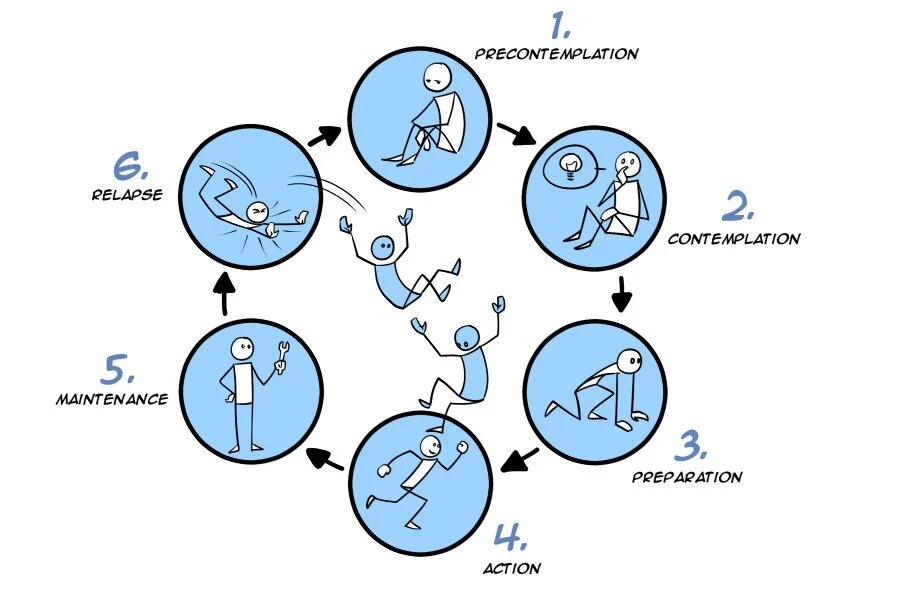Cycle of Change
Today we’re going to talk about change. Because that’s why we go to therapy, right? We want to create some sort of change in our lives whether individually, as a couple, or as a family. The world has a lot of say about change including adages like “the only thing constant is change” and “change is hard”. In some ways both of those things are true. What’s also true is that change is largely misunderstood.
If you made it here because you’re looking to make some kind of change in your life, congratulations! I’m so proud of you for starting this journey. It’s not easy and it’s not quick, but it is so so so vital to your life. Change is, SURPRISE, a system. Born out of addiction work, the cycle of change looks like this:
Graphic credit: https://blog.braive.com/cycle-of-change-3188d0228ad5
Broken down the different steps are these:
1. Precontemplation – Precontemplation can be summed up by the question “Problem? What problem?” All of us have been in the precontemplation stage at some point or another in our lives. There is something that may be an issue but we don’t feel we’re impacted enough to even really have it be a blip on our radar as something to be fixed. Thus, precontemplation, we’re not even thinking about making a change yet.
2. Contemplation- In the contemplation stage, whatever that issue that previously was not a blip on our radar, is now definitely on our radar. BUT we might not be ready to actually do something about it yet. At this point we’re thinking about the problem and deciding if it actually is a problem and then what that might mean for our lives. This is the first active stage of change. This stage can be summed up by the pop psychology saying, “the first step to solving a problem is admitting you have one.” (cue eyeroll, but then not an eyeroll because sometimes it’s kind of true)
3. Preparation- The preparation stage of change occurs when your mindset shifts from “maybe this is a problem” to “actually, this definitely is a problem and I need to change things”. During this stage you might be doing research. If your change is weight loss, you might be looking up gyms, workouts, or diet programs. If your change is stopping smoking, you might be looking up what the best ways are to do that and account for cravings and mood swings. If your change is mental/emotional/relational you may be researching therapists in the ways that were mentioned in a previous post.
4. Action-The action stage is the easiest stage to identify. At this point, you’re quite literally taking action. All of those things that you were researching and preparing for in step three are being put into place. This is where you are starting to actually see changes being made in your life, ideally for the better. This is also where habit building is occurring.
5. Maintenance- Congratulations! You’ve made a new habit! You have learned new tools! You’ve seen the positive impacts of the change you wanted to make! Now you get to live in it. You must continue to put those things into action in order to maintain the change you’ve made.
6. Relapse- This happens too! Many people don’t want to think about this because often times relapse feels like failure. Relapse is a totally normal part of any kind of behavior change. Sometimes we mess up. Or sometimes life gets in the way and the new habit we built had not accounted for life getting in the way. Mistakes and setbacks happen. When this happens you get thrust back into an earlier part of the cycle. Ideally, you are mindful enough of it happening that you’re going back into the action stage where you can put those tools back into practice and rebuild the habit. Sometimes though, we’re not mindful of the relapse for a while and then we’re put back into the contemplation or maybe even precontemplation stage and we get to move through the cycle again.
For any change you’re making, there is space to move through this cycle a number of times. Some of those changes you can make independently and this acts as a guide to know where you are, some changes are bigger and a therapist can help meet you wherever you are in this cycle and help you move through the stages and build tools to help you create and maintain change.
